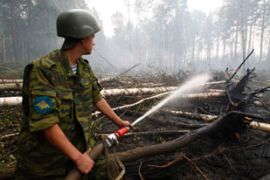Smog returns to Moscow
Shifting winds push acrid smell and dirty air from Russia’s wildfires back to capital.

The smoke has sent well-off Muscovites scrambling to air-conditioned hotel rooms as elderly pensioners retreat to specially set up health centres serving oxygenated fruit drinks.
As of last week, the smog had nearly doubled Moscow’s death rateto around 700 people a day.
Vitaly Dubonin, a resident of the city of Nizhny Novgorod, around 350km west of Moscow, told the popular Echo of Moscow radio station that the smoke in his city was dense, with pieces of ash in the air, but that few people were wearing filtering medical masks.
Small successes
But the government reported some victories on Sunday, including that it had beat back flames encroaching on a nuclear research centre located in wooded land in central Russia, near the town of Sarov.
“Despite the continuing hot weather, man is prevailing over the wildfires”, Mikhail Turkov, a spokesman for the national emergency ministry’s Volga branch, said in a statement. “There has been a firm trend of cutting the number of wildfires in the region for the first time in the past days this week”.
As of Sunday, there were 498 fires burning across the country, covering an area of around 132,200 acres, the AFP news agency reported. But that was down from 138,500 acres on Saturday and represented a quarter of the area affected at the peak of the crisis.
Emergency ministry officials said there were 16 separate fires burning in the vicinity of Moscow but that they had been reduced by almost 62 acres over the previous 24 hours.
There remained 20 acres of burning peat bogs around the capital, officials said.
This summer has been the hottest on record in Russia.
The fires have impacted Russia’s enormous wheat industry, destroying one-third of its crop and forcing an export halt.
That has pushed global wheat prices to a two-year high and has particularly affected Middle Eastern countries that depend on Russian wheat to satisfy their large demand for unleavened bread.